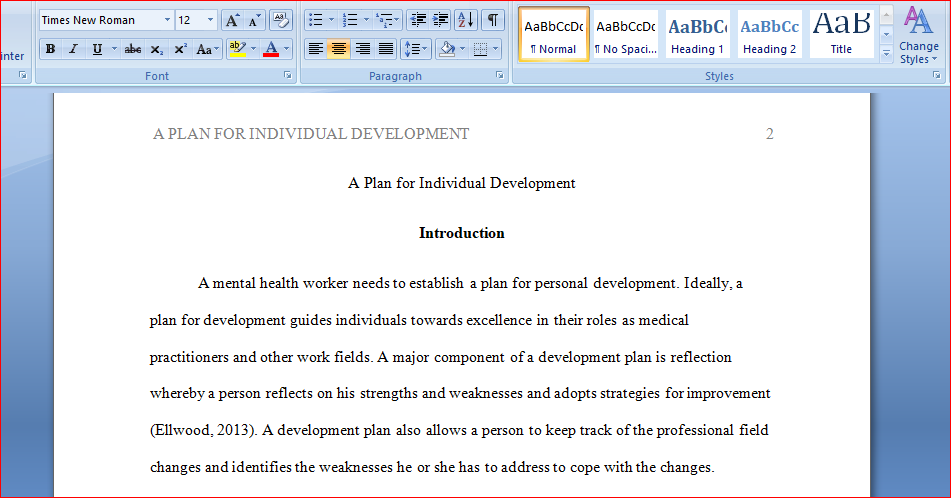Write a comprehensive plan for individual development
Write a comprehensive plan for individual development. Short summary: Introspection: Reflect on personal and professional strengths and weaknesses in terms of a future role in community mental health.
Personal Action plan
Method:
This is Reflective Practice in action. This assessment is your ‘personal action diary’ where you are actively engaging in personal growth and development that you can link back to skills that might be needed in AOD/mental health work roles.
- Establish a ‘self-development plan’, detailing the chosen activity and the justification and outcomes you wish to achieve .How will it benefit your personal development (i.e., what are your strengths and weaknesses you wish to build upon)?
- You will identify and discuss one Reflective Practice model that you will then use to evaluate your engagement in that activity. Why have you chosen your particular model and how will it enable you to efficiently engage with the activity? (Did it enable you to efficiently do so? Could you have approached it differently?)
- Participate in least one activity over the semester (involving formal or informal learning) and keep a Reflective Diary of progress (that indicates at least two ‘sessions’), using at least one model of Reflective Practice. How did your activity contribute to your intended learning outcome? Did it meet the goal? What were the limitations, and what must you do further?
- Adequately reference the learning resources, your Reflective Practice model, and the background to your activity (for example, if one were using CBT methods, you would obviously need to cite the proponents of CBT).
- Include these main points below in your plan and in your regular updates to the plan.
- What do you want to achieve (goal)
- When you want to achieve them by (time frames, increments)
- How will you know when you have achieved them (measurement)
- What will you do to reach those goals (support, research, training)
- What aspects of your job these relate to (professional accountability)
A note on the activity
It can be a course, workshop, class, interest..but you have to be able to measure your ‘personal development’ progress is some way. Activity can be informal, or formal (see below) but you must define the structure.
Informal and formal learning are quite different and both can be useful in gaining skills and knowledge in community services.
- Formal learning involves a structured, planned approach with a curriculum or stated learning outcomes that need to be achieved to reach a level of competency. Formal learning is used for attaining qualifications or achieving certificates of competency.
- Informal learning is less structured: it can be made up of a variety of activities and these can often be undertaken according to individual preferences for learning and skill development.
Informal learning is useful because it can often be completed in a flexible time frame and can be done in a very individualised way. Some people find it much more motivating and interesting to learn in a formal situation whereas others are more motivated by informal learning.
Think about which approach works best for you and which is most suited to what you are hoping to learn.
Some pointers
It will be of benefit to use as many resources as possible.
So for example if you wish to develop your abilities to better manage workplace stress, and you are interested in how Cognitive Behavioural Therapy could facilitate that, you can research about it, and undertake a course or compile a log of learning about it.
Answer preview for write a comprehensive plan for individual development
Words:1516

